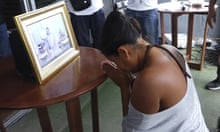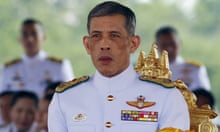Buddhist funeral ceremonies have been held at Bangkok’s grand palace for Thailand’s revered king Bhumibol Adulyadej, as the country began an extended period of mourning for the monarch, who ruled for 70 years.
Earlier in the day, soldiers, sailors, police and thousands of other Thais dressed in black knelt or sat on the street as the king’s body was driven from the hospital where he died on Thursday across the Chao Praya river to the grand palace in the centre of the city.
As a sign of deference, all Thais – including prime ministers – make sure they remain physically below members of the monarchy. Many people sobbed as the cars passed, holding their hands in prayer.
Also in the convoy was a van, painted royal yellow, transporting the heir to the throne, Crown Prince Maha Vajiralongkorn. Inside the palace, Vajiralongkorn presided over the bathing of the king’s body – a traditional Thai Buddhist funeral rite – and sat near orange-robed monks as they chanted.
The king’s body will lie at the Temple of the Emerald Buddha inside the palace complex for an undisclosed duration, to allow people to pay their respects. No date has been set for the cremation.
Farewell to beloved king pic.twitter.com/TXfRYsMB5c
— veena T. (@veen_NT) October 14, 2016
Thais have been wearing dark colours, websites have turned black and white, and television channels have been switched to royal broadcasts since the death of Bhumibol, who was the world’s longest-serving monarch and a rare source of stability in a country where there have been more than a dozen coups since he ascended to the throne in 1946 at the age of 18.
Many Thai newspapers were published without colour on Friday, including the English-language Nation paper, which was completely devoted to the life of the king:
The Nation newspaper. pic.twitter.com/qP0F6xOk1L
— Oliver Holmes (@olireports) October 14, 2016
Troops and armoured vehicles have been deployed around Bangkok’s old quarters since late on Thursday.
Thailand’s prime minister, Prayuth Chan-ocha, said in a nationally televised address minutes after the palace announced the death of the king that people were to avoid “festivities” for 30 days. The state sector will observe a year of mourning, under which civil servants are ordered to wear black.
Bhumibol was a daily presence in the life of Thais. His official portrait hangs in almost every restaurant, house and office. At cinemas, people stand for the royal anthem before films. And each morning and evening, loudspeakers play the national anthem and people in the street are expected to stop.

The government has set up a telephone hotline to help people cope with grief. Google Thailand set its homepage black and white. And all TV channels in Thailand, including some foreign satellite stations such as the BBC and CNN, have been replaced with black-and-white royal broadcasts. They included footage of the late king playing his saxophone.
A BBC producer in London said on Twitter that the Thai government was not happy with its coverage.
BBC world taken off air in #Thailand. Government not happy with BBC news coverage of #ThaiKing
— Akane Furukawa (@AkaneFurukawa) October 13, 2016
Even the infamous full moon party, a monthly all-night beach festival on the island of Koh Phangan, was cancelled, its organisers said. “We kindly invite all of you to pray for His Majesty’s soul to rise to heaven,” organisers said in a statement online.
The prime minister confirmed that Vajiralongkorn would ascend to the throne, though in a later statement he said there would be a delay in appointing the new king as he had asked for time to mourn with the country.
The privy council president, Prem Tinsulanonda, a 96-year-old former prime minister, will act as regent during the transition period. He leads the council, which acts to advise the monarch.
Vajiralongkorn, the late king’s only son and heir, does not command the same national affection as his father.
Prayuth said the country was in “immeasurable grief” but ended his Thursday evening broadcast with: “Long live His Majesty the new king.”
The UN general assembly held a minute’s silence while the British Foreign Office said that all union flags on government buildings were to be flown at half mast. It asked UK citizens, of which there are 50,000 residents and roughly 100,000 visitors in Thailand at any time, to behave respectfully and “wear sombre and respectful clothing when in public”.
Over the past few years, there had been speculation of a complete nationwide shutdown in the event of the king’s death. But the military junta, which took power from a democratically elected government in 2014, has indicated that it wants to keep the country open and running smoothly.
Thailand's lèse-majesté laws
Strict lèse-majesté laws make it a crime to criticise, defame or insult members of the royal family.
In practice, this means open discussion or critical reporting about the royal family is considered illegal.
The military junta, which seized power in 2014, has been criticised for using the law – which can see people jailed for up to 15 years on each count – to stifle opposition.
In 2015, a man was jailed for 30 years over six Facebook posts and the local printer of the New York Times refused to publish an edition with a story on the king.
Prayuth said security was his top priority and asked businesses to stay active and stock investors not to dump shares. Banks remained open on Friday. The country’s stock market and currency remained stable, despite jitters earlier this week after the palace declared the king’s condition unstable on Sunday.
Open discussion of the monarchy is restricted by a strict lèse-majesté law that makes criticism of the royal family punishable by years in prison. In practice, this means open discussion of the succession is considered illegal.
“The death of King Bhumibol Adulyadej is a landmark event in Thai politics, with stark implications for that country’s political stability. The vast majority of living Thais has no memory of any other king, and also only knows the monarchy as an almost sacred institution that pervades Thai politics and society,” said Tom Pepinsky, a south-east Asia expert at Cornell University.
“The dominant narrative among many observers is that the king has been a stabilising force, but this belies the decades of coups that have plagued modern Thai history. His death means that the Thai political system must find an alternative focal point around which to unite the country’s factionalised population.”







